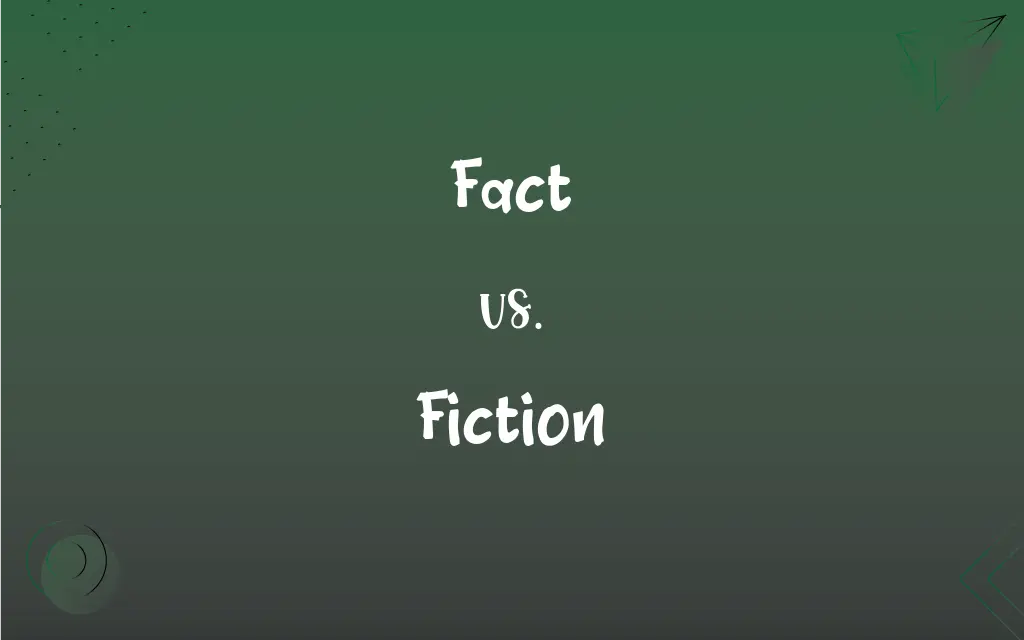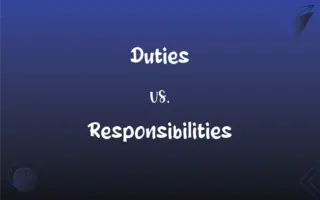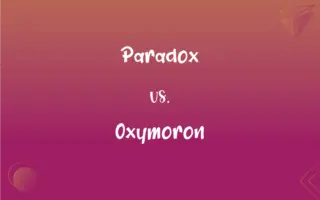Fact vs. Fiction: What's the Difference?
Edited by Aimie Carlson || By Harlon Moss || Updated on October 21, 2023
A fact is a statement that can be proven true or false, while fiction is a narrative or statement that is invented or imagined.

Key Differences
A fact is a piece of information that has been verified and can be substantiated with evidence. This means that facts are objective truths, rooted in reality, and not influenced by personal feelings or interpretations. On the other hand, fiction is a creation of the imagination and does not claim to represent reality. It encompasses stories, narratives, and accounts that are invented.
When one speaks of facts, they refer to data, events, or descriptions that have been confirmed and accepted by a broader community. These truths stand firm, regardless of individual beliefs or perspectives. Fiction, however, is not bound by the constraints of truth. Fiction can break boundaries, explore hypothetical scenarios, and create worlds beyond our own.
The realm of facts is vast, from historical events to scientific data. When someone cites a fact, it carries the weight of authenticity, making it crucial in decision-making, debates, and learning. In contrast, fiction allows writers and readers to explore human experiences, emotions, and possibilities that might not exist in the factual world. It's a tool for entertainment, introspection, and even catharsis.
Although facts and fiction serve different purposes, both hold immense value. Facts provide a foundation for knowledge, understanding, and progression. Fiction, meanwhile, offers a window into the human soul, allowing for emotional connection, reflection, and a deeper understanding of the human experience.
While facts remain consistent and unchanging, fiction evolves, adapting to cultural shifts, societal needs, and human emotions. Despite their differences, both fact and fiction enrich our lives, offering clarity, escape, and profound insights into the world around us.
ADVERTISEMENT
Comparison Chart
Nature
Objective and verifiable
Subjective and invented
Based On
Reality and evidence
Imagination and creativity
Purpose
To inform and provide knowledge
To entertain, reflect, or explore possibilities
Flexibility
Consistent and unchanging
Evolves with cultural and societal shifts
Emotional Connection
Typically neutral
Can evoke strong emotions and personal reflection
ADVERTISEMENT
Fact and Fiction Definitions
Fact
A piece of information verified by evidence.
The documents confirmed the fact of his citizenship.
Fiction
Literature that describes imaginary events and characters.
Science fiction explores futuristic concepts and technologies.
Fact
A statement proven to be true.
The fact that Earth orbits the Sun was once controversial.
Fiction
A narrative or account that is invented.
The novel is a work of fiction based on the author's imagination.
Fact
An undeniable truth.
The fact remains that we need to address the issue.
Fiction
A representation not based on factual events.
Popular myths are rooted in fiction.
Fact
Something known to have happened.
Historical records establish the fact of the empire's decline.
Fiction
A creation of the mind.
The idea of a perfect world is often fiction.
Fact
An objective reality.
It's a fact that water boils at 100°C under standard conditions.
Fiction
An invented or untrue story.
While entertaining, the film is pure fiction.
Fact
Knowledge or information based on real occurrences
An account based on fact.
A blur of fact and fancy.
Fiction
The category of literature, drama, film, or other creative work whose content is imagined and is not necessarily based on fact.
FAQs
What defines a fact?
A fact is a statement or assertion that can be proven true or false based on evidence.
Is an opinion considered a fact?
No, an opinion is a personal belief or feeling and isn't objectively verifiable like a fact.
Can fiction be based on real events?
Yes, some fiction is inspired by or based on real events, but with added imaginative elements.
How is a fact verified?
Facts are verified through empirical evidence, research, or reliable documentation.
Can a fact be disputed?
A fact can be disputed, but with enough evidence, it can be universally accepted as true.
How are facts used in debates?
Facts provide a foundation for arguments and validate points made in debates.
How do people discern fact from fiction?
Discerning requires critical thinking, cross-referencing with reliable sources, and an understanding of the context.
Why is fiction important?
Fiction allows exploration of human experiences, emotions, and hypothetical scenarios, offering entertainment and reflection.
Are textbooks considered sources of facts?
Generally, textbooks aim to provide factual information, but they can also contain interpretations or perspectives.
Can facts be found in fiction books?
Yes, while the narrative is imagined, fiction can incorporate factual elements or settings.
Is fiction always untrue?
Fiction is invented or imagined, but it can be based on or inspired by real events.
Can a fact change over time?
While the truth doesn't change, our understanding or knowledge of facts can evolve with new evidence.
What genres fall under fiction?
Genres like fantasy, science fiction, romance, mystery, and historical fiction are examples.
Why are facts important in journalism?
Facts ensure accuracy, credibility, and informed decision-making for readers.
How does historical fiction differ from fiction?
Historical fiction is set in the past and may include real events or people, while fiction may not adhere to any historical accuracy.
Are novels and short stories fiction?
Yes, novels and short stories are typically considered fiction, though they can be based on real-life events.
What's the primary goal of fiction writing?
Fiction aims to entertain, provoke thought, reflect society, or express the author's vision.
Is all fiction completely made up?
While fiction is imaginative, it can have elements of truth or be inspired by real events or people.
Can fiction influence society?
Absolutely, fiction can shape societal views, inspire movements, or offer commentary on issues.
Is a hypothesis the same as a fact?
No, a hypothesis is a proposed explanation to be tested; a fact has already been verified.
About Author
Written by
Harlon MossHarlon is a seasoned quality moderator and accomplished content writer for Difference Wiki. An alumnus of the prestigious University of California, he earned his degree in Computer Science. Leveraging his academic background, Harlon brings a meticulous and informed perspective to his work, ensuring content accuracy and excellence.
Edited by
Aimie CarlsonAimie Carlson, holding a master's degree in English literature, is a fervent English language enthusiast. She lends her writing talents to Difference Wiki, a prominent website that specializes in comparisons, offering readers insightful analyses that both captivate and inform.
































































